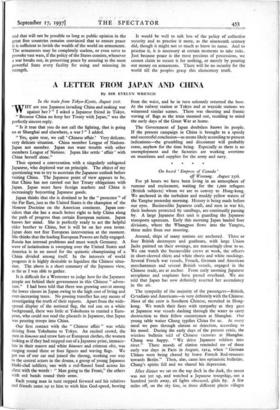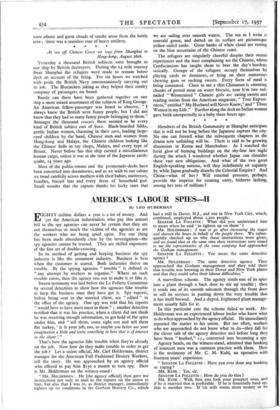On board ' Empress of Canada' off Woosung. August 25th.
For 36 hours we have been living in an atmosphere of rumour and excitement, waiting for the 1,000 refugees (British subjects) whom we are to convey to Hong-kong. We anchored in the turbulent and muddy yellow waters of the Yangtse yesterday morning. History is being made before our eyes. Businesslike Japanese craft, and men in war kit, their lookouts protected by sandbags, are continually passing by. A large Japanese fleet unit is guarding the Japanese transports upstream. Early this morning Japan landed four divisions, where the Whangpoo flows into the Yangtse, three miles from our mooring.
Around, ships of many nations are anchored. Three or four British destroyers and gunboats, with large Union Jacks painted on their awnings, are reassuringly close to us. We can watch the businesslike crews at work, the officers in short-sleeved shirts and white shorts and white stockings. Several French war vessels, French, German and American merchantmen and several British vessels, engaged in the Chinese trade, are at anchor. From early morning Japanese aeroplanes and seaplanes have passed overhead. We are told that Japan has now definitely asserted her ascendancy in the air.
The sympathy of the majority of the passengers—British, Caladians and Americans—is very definitely with the Chinese. Most of the crew is Southern Chinese, recruited in Hong- kong. We watch their faces with sympathy as they gaze at Japanese war vessels dashing through the water to carry destruction to their fellow countrymen at Shanghai. Our young table waiter Chang typifies China for us. At every meal we pass through elation or dejection, according to his mood. During the early days of the present crisis, the wireless bulletin told of Chinese victories at Shanghai. Chang was happy. " We drive Japanese soldiers into river." These moods of elation reminded me of those early war days in Paris in August, 1914, when " German Uhlans were being chased by brave French Red-trousers towards Berlin." Then, alas, came less optimistic bulletins. Chang's spirits fell and we shared his depression.
After dinner we sat on the top deck in the dark, the moon was not yet up, and watched a Japanese troopship,. not a hundred yards away, all lights obscured, glide by. A few miles off, on the sky line, in three different places villages were aflame and great clouds of smoke arose from the battle area ; there was a ceaseless roar of heavy artillery.











































 Previous page
Previous page